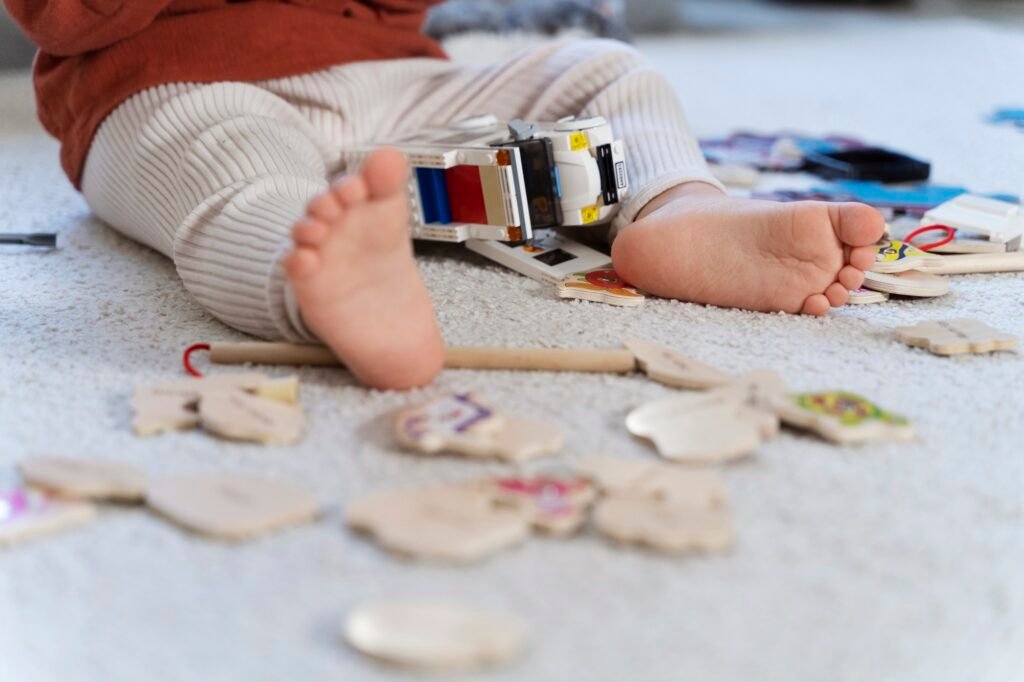Choosing the right toys for your child is an important decision in early development, and one of the best options surely must be Montessori toys. The toys are designed to work with developing skills of independence, creativity, and love of learning through hands-on playing that captures children’s senses to explore. Such educational means serve as not only enjoyment but also the basis for crucial skills: problem-solving, motor coordination, and emotional intelligence. In this article, we will introduce you to 15 essential Montessori toys that promote your little one’s growth in development and can never run out of discovery.
Why Choose Montessori Toys for Your Child?

The Montessori Toys support the child’s development. Instead of focusing primarily on entertainment as most regular toys do, these Montessori toys were purposeful and hands-on in a child’s education. Montessori toys are carefully prepared for involvement in your child’s senses for the examination and exploration of things around. These toys promote self-directed plays, and through this, they build confidence, concentration, and motor skills; all this while fostering a sense of responsibility and respect toward their environment. Choosing Montessori toys is to cater to the developmental needs of your children with priority, giving them tools that will nurture curiosity for growth in a meaningful manner.
The Benefits of Montessori Toys in Early Development
Montessori toys have many advantages in the field of a child’s development. These are materials or toys prepared to encourage hands-on learning, which develops the children’s understanding of concepts through their senses and real-life experiences. First of all, Montessori toys stimulate independent playing of the child: he or she can freely decide what to play with, how to solve his problems, which further provides self-confidence and autonomy to him.
Besides, Montessori toys are usually simple and open-ended, allowing creativity and imagination. They also promote fine and gross motor skills development by manipulating objects, such as stacking, sorting, or fitting pieces together. By repetition, Montessori toys develop concentration and focus in children, besides enhancing cognitive abilities such as memory, spatial awareness, and logical thinking. Overall, Montessori toys provide a foundation for well-rounded development, helping a child grow intellectually, emotionally, and physically in a very balanced and engaging manner.
Key Features to Look for in Montessori Toys
When it comes to choosing Montessori toys for your child, the key is to look for features that fit their developmental needs and will inspire purposeful play. Here are some key features to look for:
Simplicity: Montessori toys are often simple in design, with minimal distractions. This allows children to focus on the task at hand, promoting concentration and independent learning.
Natural Materials: Most Montessori toys are made of natural materials such as wood, cotton, and wool. These materials are durable and offer a tactile experience that helps in sensory development.
Open-Ended Play: Versatility in a toy allows children to use their imagination and creativity. Open-ended toys do not have one particular way to play with them; this helps develop problem-solving skills and fosters creativity.
Age Appropriateness: Montessori toys need to align with the developmental stage of your child. They should challenge your child while not being too hard or too easy for them, so learning and growth are continuously facilitated.
Independence: Montessori toys encourage independence in a child. It must be easy to handle on their own and would contribute toward confidence and self-esteem.
Educational Value: The Montessori toy should further the development of certain skills, whether it is in motor skills, cognitive, or emotional intelligence. Look for the ones that would engage a child’s mind and body to explore through activity and, hence, learn.
By focusing on such features, you can go ahead to select Montessori toys that entertain yet educate your child with all necessary tools for growth and development.
15 Must-Have Montessori Toys for Your Little One
Here are 15 must-have Montessori toys, perfect for fostering your little one’s development:
Montessori Wooden Blocks
These simple yet versatile blocks help develop fine motor skills, spatial awareness, and creativity as children stack, sort, and build with them.
Shape Sorters
Shape sorters are great for teaching shape recognition, hand-eye coordination, and problem-solving-skills, allowing children to explore and figure out where different shapes fit.
Sorting and Stacking Toys
Such toys as those that allow children to stack or sort objects by size, shape, or color develop fine motor skills, concentration, and early math concepts.
Montessori Puzzle Toys
Puzzles with simple, wooden pieces help enhance problem-solving skills, concentration, and hand-eye coordination. They also encourage patience as children work through challenges.
Nesting Cups
These colorful cups help in the understanding of concepts such as size and order, enhancing fine motor skills and cognitive development as children stack, arrange, and nest them.
Montessori Lacing Beads
Lacing beads develop fine motor, hand-eye coordination, concentration, and introduce basic patterns and sequences to young learners.
Montessori Sensory Balls
Soft, textured sensory balls engage children’s tactile senses and are excellent for developing hand-eye coordination and fine motor control.
Montessori Wooden Tray with Pegs
This toy will help young children practice matching, sorting, and sequencing while developing fine motor control by placing pegs into the corresponding holes.
Wooden Play Kitchen Set
The play kitchen will nurture imaginative play, role-playing, and socializing. It will also teach your child about daily routines and everyday living.
Musical Instruments
Simple instruments, such as a xylophone or tambourine, will encourage an appreciation of music early on while helping with rhythm, motor control, and auditory development.
Montessori Tactile Books
Books with textures or various materials incorporated into them offer a tactile reading experience, encouraging sensory exploration and early language development.
Wooden Animal Figurines
Animal figurines help vocabulary building, imaginative play, and fine motor skills as children would manipulate and create scenarios with the figurines.
Montessori Sandpaper Letters
These tactile letters introduce children to the alphabet, helping with letter recognition, sound association, and early writing skills through the sense of touch.
Threading Toys
Threading toys allow children to practice fine motor skills, pattern-making, and concentration while improving hand-eye coordination.
Montessori Sensory Bins
A sensory bin filled with natural materials like rice, beans, or water can stimulate all five senses, providing an engaging way to explore textures, colors, and cause-and-effect relationships.
These Montessori toys are fun and yet very important to a child’s learning, aiding in the development of a child’s cognitive, motor, and social skills.
How to Integrate Montessori Toys into Daily Playtime
Integrating Montessori toys into daily playtime can create a rich, engaging environment for your child’s development. Here are some practical tips for making the most of Montessori toys:
Set Up a Montessori-Friendly Play Space
Create a dedicated area where your child can access their toys independently. Keep the space neat and organized, ensuring that toys are easy to reach and rotate regularly to maintain interest and engagement.
Encourage Independent Play
Allow your child to explore and interact with the toys on their own. Montessori toys are designed to promote independence, so give your child the freedom to choose what they want to play with and how they want to play with it.
Incorporate Toys into Daily Routines
Incorporate Montessori toys into everyday activities such as mealtimes, cleaning, or dressing. For instance, during mealtime, a child could set the table with small utensils; while dressing, he might practice buttoning his shirt; or during play, he could sort items according to color or shape.
Rotate Toys to Maintain Interest
Instead of overwhelming your child with a large collection of toys, rotate them every few days. This keeps the playtime fresh and encourages children to focus deeply on a few toys at a time, fostering concentration and exploration.
Be an Active Observer
Pay close attention to the child to assess how they work with or play with their toys: which toys they reach for most quickly, and their approach; such observation will offer an opportunity for targeted learning provision. Following the Child’s Lead
Montessori philosophy is based on observation and following the interests of the child. If your child is especially interested in a certain toy, let them have extra time to explore it. This helps the child develop concentration and a love for learning.
Incorporate Practical Life Activities
You can integrate Montessori toys with practical life activities such as pouring, sorting, or sweeping. These types of activities will teach essential life skills while reinforcing the developmental concepts behind the toys.
Use Simple Instructions
Give as little direction as necessary and avoid over-directing. Demonstrate play or provide simple, direct instructions if a child seems unclear about how to use a toy, while giving the space for your child to come up with solutions for themselves.
Include Your Child in Toy Maintenance
Engage your child in cleaning up the toys and organizing the play area to teach your child to be responsible with their toys. It not only inculcates a sense of responsibility among them but also helps in fulfilling the Montessori concepts of independence and respect toward their belongings.
Encourage Social Play with Montessori Toys
While Montessori toys are designed for independent playing, they can also be utilized to foster social interactions. You can invite siblings or friends to join in using the toys to teach them about sharing, turn-taking, and cooperation.
Integrating Montessori toys into daily playtime thoughtfully can create an enriching and dynamic environment that encourages your child’s growth and love of learning.
Conclusion
Montessori toys during the playtime of your child are not only for their enjoyment but also to help them grow, become independent, and develop life skills. These are designed to be used by children through active learning: creating, solving problems, and developing their motor skills. By selecting simple, open-ended Montessori toys adapted to your child’s stage of development, you can provide an enriched supportive environment for his or her growth. Be it through self-directed explorations, everyday routines, or directed plays, Montessori toys afford boundless possibilities for your child to experience learning and excel in joyful, meaningful ways.








